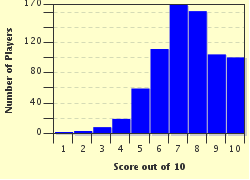Quiz Answer Key and Fun Facts
1. Which of these is an early sign of renal failure?
2. If the doctor suspects kidney disease, he will order a blood test to detect what?
3. There is only one type of dialysis.
4. What can't a haemodialysis patient do during the dialysis session?
5. Nutrition is important to people with kidney failure?
6. Renal patients must be careful of the amount of phosphate they consume. What common food contains high levels of phosphate?
7. Why do dialysis patients need to restrict fluids?
8. One of the effects during haemodialysis is:
9. In the USA and UK, at the end of the twentieth century, who could register as an organ donor?
10. What is one side effect after taking anti-rejection drugs?
Source: Author
nurf
This quiz was reviewed by FunTrivia editor
crisw before going online.
Any errors found in FunTrivia content are routinely corrected through our feedback system.


